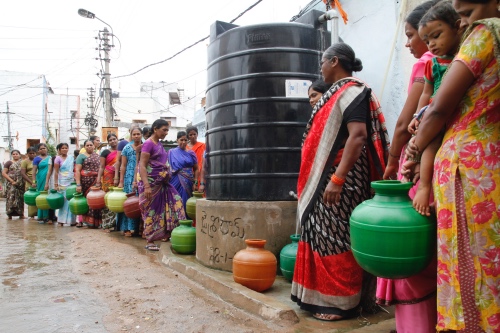Some 844 million people are struggling to access clean water, according to revised figures from WaterAid.
In its latest annual State of the World’s Water report, the organisation says the figure is 200 million higher than the previous number thanks to a change in the way the information is analysed with anything longer than a 30 minute round trip to get water no longer counting as having access.

Women queue up to collect water from the common water source in Anna Nagar Basti, Hyderabad. PICTURE: Ronny Sen/WaterAid
This means that Uganda and Niger have joined the ranks of the countriest with the lowest access rates alongside countries such as India, where more than 160 million people lack access, Ethiopia, where some 60 million lack access, and Papua New Guinea where some 37 per cent of the population lack at least basic access.
The report – released ahead of World Water Day on 22nd March – shows that some 60 per cent of the world’s population now live in water stressed areas and that every year some 289,000 children under five die of diarrhoeal illness directly linked to dirty water, inadequate toilets and poor hygiene.
The report also reveals there is significant gaps between the rich and poor in nations where water access is an issue. In Niger, for example, only 41 per cent of the poorest people have access to clean water while 72 per cent of the wealthiest do and in neighbouring Mali the gap is even greater.
Rosie Wheen, WaterAid Australia’s chief executive, says a situation in which 289,000 children die each year is “unacceptable” and called for faster progress toward addressing the problem.
“This year presents a time for real change and progress towards UN Sustainable Development Goal 6 – to deliver access to water and sanitation for all by 2030 – will be reviewed by world leaders in New York in July,” she noted. “We urge them to take real action as without water and sanitation, none of the other Global Goals – for alleviating poverty, improving health and creating a fairer and more sustainable world – will be achieved.”
Ms Wheen described the situation in Cape Town – which has been facing severe water shortages – as a “wake-up call”.
“Already 60 per cent of the world are living in water stress and this is expected to increase, with extreme weather brought by climate change, urbanisation, industrialisation and the simple ever-increasing demand for water, ” she says. “We know progress is possible: India has reached more than 300 million people in 15 years alone. But progress requires financing, political priority and the will to ensure the basic needs of every person are met, to ensure a better future for millions around the world.”






